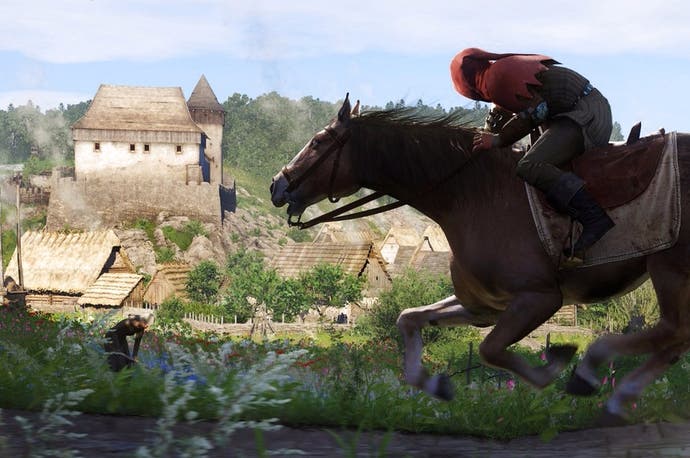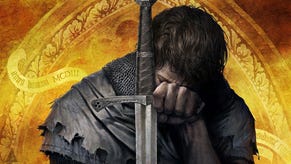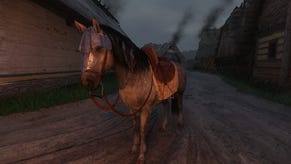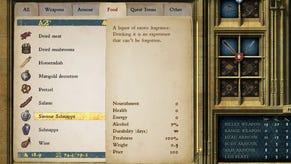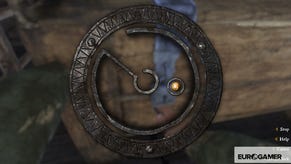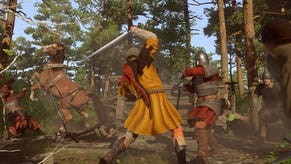Don't be put off by Kingdom Come: Deliverance's stiff characters
There's surprising RPG depth underneath.
Historical-not-fantastical medieval role-playing game Kingdom Come: Deliverance has long been in the headlines. Ever since we saw its next-gen mud we followed it, through a Kickstarter campaign and beyond, and now nearly four years later it's finally nearly ready, due 13th February 2018 on PC, PlayStation 4 and Xbox One. But being in the public eye for so long has taken its toll, and the sheen has dulled. Other role-playing games have been and gone in that time, such as The Witcher 3: Wild Hunt, and the goalposts have moved. What was once so impressive in Kingdom Come: Deliverance is now par for the course.
Czech developer Warhorse has also had to face reality and assess what can and cannot be achieved if it wants to finish a game, so flashy features like mounted combat, for instance, are out, although horse-riding remains. What we see now is the reality of what a new studio on Kickstarter money - and plenty of private investment and now a co-publisher in Deep Silver - has managed to create. No more Kickstarter dreaming of something to blow The Elder Scrolls series out of the water. This journey back down to earth came with a nasty bump recently when Warhorse received flak for ropy facial animations and voice acting in a new story trailer, embedded below.
Which is a shame. It's a shame because, in the flesh, Kingdom Come: Deliverance shows a whole side you cannot see in trailers. You can't see the game's open approach to quests, which effectively rings an area for your attention but otherwise stands back and lets you find your way through it, no magical compass pointing you this way or that. You have to listen for clues about where to go next, and if you don't, you won't find out. Kingdom Come isn't afraid of letting you get lost. It also isn't afraid to withhold information from you in conversations. If you want it, earn it - convince the person you're talking to dish up their secrets.
Taken into account in dialogue are your speech skill, your appearance, strength and "badassness", as the PR puts it. Imagine being covered in blood: that affects your badassness. Reminds me of all the conversations in Dragon Age where you're drenched in blood; in Kingdom Come, poor old Jane the peasant will have chickens if you turn up looking like that. Other skills like First Aid play into dialogue too. I spot a man's injury and offer to sort it because my First Aid skill allows it, and as a result I get the information I want.
Kingdom Come: Deliverance can afford to let you fail because there are always so many other ways to achieve a goal. I play a quest involving a massacre of horses - no, not the Grand National - and all I'm really told is 'go find out what happened'. I could achieve that through talking, cross-checking answers to expose liars, or I could simply stumble upon a broken fence and into a clandestine forest rendezvous instead. It's up to you. Your guiding principle should be your gut, your 'What would I do?' instinct.
This stand-back approach works because Kingdom Come: Deliverance is beautiful, a pleasure to explore. Show me a game with a nicer countryside and I will buy you a mead. What's more, it's historically accurate, a deeply researched recreation of the area Warhorse comes from - Prague, Czech Republic - from centuries ago. Few games have better sense of time and place, and the fastidious eye for historic detail touches everything.
The map, for example, oh the map! It is history meets whimsy, painter meets cartographer. Frumpy forests and cheerful rural villages cleanly, coherently laid out, and where even giant knights decorating the map serve a purpose, cluing you in to, say, a settlement under army control.
The menus are in general a delight and contain surprising role-playing depth within. Equipment consists of many layers in Kingdom Come: Deliverance, as it did in this period of history. There are 20 equipment slots, 20! Six for the body, four for the legs, four for the head, two for jewellery and four for weapons. Layers upon layers you can wear. And you can forget about carrying an army's worth of dead people's armour because in this game you can only carry what a human realistically can - no Hermione's magic storage bag for you.
Much has been made of the game's 'as realistic as possible' combat, underpinned by an ambitious physics system where successful hits do not swish through enemies but land with physical force, devastating them if they are not armoured in this area but glancing off them if they are. What I didn't realise was there's a whole skill tree of medieval martial arts to go with this, offering pommel strikes to multi-hit combos and more. Actual combos, naturally - actual moves from historically researched swordplay. But the skills go much wider than swords and combat, and even Speech offers its own set of perks. On and on the menus go, deeper and deeper, the suggestion being endless possibilities for the role you want your character in this game to play.
To me it's this RPG depth and beautiful world that are the stars of Kingdom Come: Deliverance, but what jars my experience is the story, and the characters telling it. They are stiff and they do jitter and jank, and the faces struggle to believably say what you're hearing. Warhorse has clearly tried - there are many motion captured sequences - and that is laudable, but I wonder would the money have been better spent widening and deepening the systems and sandbox approach rather than chasing a level of animated storytelling a studio of this size was always going to struggle to reach?
Then again, I have only seen a fraction of a game with around 50 hours of play. Maybe if I'd seen the story from the beginning I'd feel differently; maybe I'll feel differently later on. Whatever the outcome, it's far from a deal breaker, because Kingdom Come: Deliverance will stand unique anyway as an RPG forged against the grain, a Kickstarter rebel. In a world of so many safe me-toos, Kingdom Come: Deliverance should not be overlooked.
